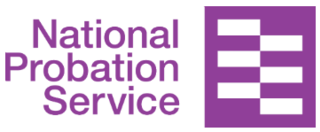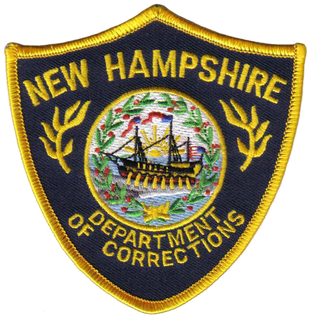Related Research Articles

The Mississippi Department of Corrections (MDOC) is a state agency of Mississippi that operates prisons. It has its headquarters in Jackson. As of 2020 Burl Cain is the commissioner.
Probation in criminal law is a period of supervision over an offender, ordered by the court often in lieu of incarceration.

The Probation Service for England and Wales is a statutory criminal justice service, mainly responsible for the supervision of offenders in the community and the provision of reports to the criminal courts to assist them in their sentencing duties. It was established in its current form by the Criminal Justice and Court Services Act in April 2001, but has existed since 1907 as a set of area-based services interacting at arm's length with central government.

A probation or parole officer is an official appointed or sworn to investigate, report on, and supervise the conduct of convicted offenders on probation or those released from incarceration to community supervision such as parole. Most probation and parole officers are employed by the government of the jurisdiction in which they operate, although some are employed by private companies that provide contracted services to the government.

The Michigan Department of Corrections (MDOC) oversees prisons and the parole and probation population in the state of Michigan, United States. It has 31 prison facilities, and a Special Alternative Incarceration program, together composing approximately 41,000 prisoners. Another 71,000 probationers and parolees are under its supervision. The agency has its headquarters in Grandview Plaza in Lansing.
The U.S. Probation and Pretrial Services System, also called the Office of Probation and Pretrial Services, part of the Administrative Office of the United States Courts, is the probation office of the federal judiciary of the United States. It serves the United States district courts in all 94 federal judicial districts nationwide and constitutes the community corrections arm of the Federal Judiciary. It administers probation and supervised release under United States federal law enforced by probation officers.

The Tennessee Department of Correction (TDOC) is a Cabinet-level agency within the Tennessee state government responsible for the oversight of more than 20,000 convicted offenders in Tennessee's fourteen prisons, three of which are privately managed by CoreCivic. The department is headed by the Tennessee Commissioner of Correction, who is currently Frank Strada. TDOC facilities' medical and mental health services are provided by Corizon. Juvenile offenders not sentenced as adults are supervised by the independent Tennessee Department of Children's Services, while inmates granted parole or sentenced to probation are overseen by the Department of Correction (TDOC)/Department of Parole. The agency is fully accredited by the American Correctional Association. The department has its headquarters on the sixth floor of the Rachel Jackson Building in Nashville.

The New Hampshire Department of Corrections is the government agency in the U.S. state of New Hampshire charged with overseeing the state correctional facilities, supervising probation and parolees, and serving in an advisory capacity in the prevention of crime and delinquency. As of June 30, 2013, the Department had an inmate population of 2,791, 15,267 on probation or parole, and 893 total employees, 470 as corrections officers and 64 as probation/parole officers. The agency has its headquarters in Concord.

The Utah Department of Corrections (UDC) is a government agency dedicated to the management and supervision of convicted felons in the U.S. state of Utah. It is currently led by the Executive Director Brian Nielson. It has its headquarters in the Utah Department of Corrections Administration Building in Draper.
The Georgia State Board of Pardons and Paroles is a five-member panel authorized to grant paroles, pardons, reprieves, remissions, commutations, and to remove civil and political disabilities imposed by law. Created by a constitutional amendment in 1943, it is part of the executive branch of Georgia's government. Members are appointed by the governor to staggered, renewable seven-year terms subject to confirmation by the State Senate.
The National Capital Revitalization and Self-Government Improvement Act of 1997, also known as the Revitalization Act, was enacted on August 5, 1997, with provisions to reform the criminal justice system in Washington, D.C. The act was spearheaded by North Carolina Republican Senator Lauch Faircloth.

The Idaho Department of Correction (IDOC) operates nine prisons, four community release centers and 20 probation and parole offices in seven districts located throughout the state of Idaho. The agency has its headquarters in Boise.

United States federal probation and supervised release are imposed at sentencing. The difference between probation and supervised release is that the former is imposed as a substitute for imprisonment, or in addition to home detention, while the latter is imposed in addition to imprisonment. Probation and supervised release are both administered by the U.S. Probation and Pretrial Services System. Federal probation has existed since 1909, while supervised release has only existed since 1987, when it replaced federal parole as a means for imposing supervision following release from prison.
Hawaii's Opportunity Probation with Enforcement (HOPE) is an intensive supervision program that aims to reduce crime and drug use while saving taxpayers' dollars spent on jail and prison costs. HOPE deals with offenders who have been identified as likely to violate the conditions of their probation or community supervision.
Computerized Criminal History
Judicial Correction Services, Incorporated (Delaware) (JCS) is a privately held probation company established in 2001 and based in Georgia. The company acts as a self-funding probation agency for local courts, mostly in the southeast United States. The company is part of the private "extra-carceral" or "alternatives to incarceration" industry, which includes private halfway houses, probation services and/or electronic monitoring. This industry, which includes services such as Judicial Correctional Service is "offender-funded", shifting the cost of probation onto probationers. The industry includes private extra-carceral institutions such as halfway houses, probation services and electronic monitoring.

The Massachusetts Trial Court Probation Service, more commonly referred to as the Massachusetts Probation Service (MPS), is the Commonwealth's primary supervisory law enforcement agency. Created in 1878, it is the first Probation agency established in the United States. The service was created based on the work of John Augustus, the Boston area bootmaker who is credited as the "Father of Probation".
The Georgia Council on Criminal Justice Reform is a fifteen-member, non-partisan state commission tasked with conducting annual comprehensive reviews of criminal laws, criminal procedure, sentencing laws, adult correctional issues, juvenile justice issues, enhancement of probation and parole supervision, better management of the prison population and of the population in the custody of the Department of Juvenile Justice, and other issues relates to criminal proceedings and accountability courts in the state of Georgia.

The Georgia Department of Community Supervision (DCS) is an executive branch agency of the U.S. state of Georgia. DCS is headquartered in the James H "Sloppy" Floyd Veterans Memorial Building with additional field offices throughout the state. DCS is tasked with: the supervision and reentry services of felony probationers and parolees; the oversight of adult misdemeanor probation providers; and, provides administrative support to the Georgia Commission on Family Violence (GCFV).
Sentinel Offender Services is a criminal justice services and original equipment manufacturing company based in Anaheim, California. The company was founded in 1993 by Robert Contestabile, who is currently the chairman. Tom Flies is chief executive officer.
References
This article includes a list of general references, but it lacks sufficient corresponding inline citations .(April 2014) |
- Albin-Lackey, Chris (February 2014), "Profiting from Probation: America's "Offender-Funded" Probation Industry" (PDF), Human Rights Watch, ISBN 978-1-623131-005 , retrieved 2014-08-03
- Alexander, Anne (September 7, 2006), Private sector could run Probation Service, Leeds, England: Yorkshire Evening Post, archived from the original on 2014-08-08, retrieved 2014-08-03MGN Ltd via
- Balko, Radley (May 6, 2014), "The Perils of Privatized Probation", The Washington Post , archived from the original on 2014-05-07, retrieved 2021-11-20
- Barton-Bellessa, Shannon M. (2012), "SAGE Encyclopedia of Community Corrections", SAGE
- Bronner, Ethan (July 2, 2012), "Probation Fees Multiply as Companies Profit", New York Times , Childhildersburg, Alabama, retrieved 2014-08-03
- Bronner, Ethan (July 13, 2012a), "Judge in Alabama Halts Private Probation", New York Times, retrieved 2014-08-03
- "Burdette vs Harpersville" (PDF), Circuit Court of Shelby County, Alabama, Civil Action No. CV 2010-900183, Shelby County, Alabama, July 11, 2012, retrieved 2014-08-04
- Cohen, Andrew (February 5, 2014). "The Private Probation Problem Is Worse Than Anyone Thought". The Atlantic.
- "2010 Annual Report on Form: 10-K", Corrections Corporation of America, 2010
- "Whitworth v. State", Court of Appeals of Georgia, no. A05A1340, pp. 23–24, September 29, 2005, retrieved 2014-08-04
- "Private probation: A juicy secret", The Economist, Democracy in America, April 22, 2014
- Edsall, Thomas (August 26, 2014), "The Expanding World of Poverty Capitalism", The New York Times , retrieved 2014-08-29
- Finn, P; Parent, D (October 1992), "Making the Offender Foot the Bill: A Texas Program", National Institute of Justice, U.S. Department of Justice, Rockville, MD, no. NCJ-136839, retrieved 2014-08-04
- "Whitworth v. State", Georgia, pp. 23–24, 2005
- Gambino, Lauren (April 16, 2014), Georgia bill would protect controversial for-profit probation industry: State lawmakers support private law enforcement contractors that critics say are unconstitutional and too powerful, UK: The Guardian, retrieved 2014-08-03
- Honig, Abram (October 24, 2014). ""Profiting from Probation" in Michigan". Michigan Policy Network. Archived from the original on 2014-12-05. Retrieved 2014-12-01.
- "Debtors Prison' Run by Harpersville Municipal Court Shut Down", Huffington Post, Columbiana, Alabama, July 15, 2012, archived from the original on 2012-07-16, retrieved 2014-08-03
- "INC Company Profile", Judicial Correction Services, 2010
- "Judicial Correction Services", Company website retrieved, 2011, archived from the original on 2012-07-06, retrieved 2012-07-03
- McWhirter, Cameron; Rankin, Bill (March 11, 2009), "Lawmaker Writes Bill That Affects Own Private Probation Industry", The Atlanta Journal-Constitution, Atlanta, Georgia
- Rappleye, Hannah; Seville, Lisa Riordan (April 14, 2014), "The Town That Turned Poverty Into a Prison Sentence", The Nation, retrieved 2014-08-03
- "Roadblocks to Reform: Perils for Georgia's Criminal Justice System", Southern Center for Human Rights (SCHR), Atlanta, GA, November 2012
- Reynolds, Morgan O. (June 2000), Privatizing Probation and Parole (PDF), NCPA Policy Report, Dallas, Texas: National Center for Policy Analysis, ISBN 1-56808-089-1, archived from the original (PDF) on 2011-05-26, retrieved 2014-08-03
- Salzer, James (November 24, 2014). "Supreme Court: Private probation legal, but not drawn-out sentences". ajc.com. Archived from the original on 2015-03-27.
- Samilton, Tracy (September 29, 2014). "ACLU says "pay or stay" is modern-day version of debtors prisons". Michigan Radio.
- Schloss, Christine S.; Alarid, Leanne F. (2007), "Standards in the Privatization of Probation Services: A Statutory Analysis" (PDF), Criminal Justice Review (32): 233–245, doi:10.1177/0734016807304949 , retrieved 2014-08-03
- "Probation & Court Services", Sentinel Offender Services, nd, archived from the original on 2007-06-26, retrieved 2014-08-03
- Solon, Sarah (June 18, 2014), "Preying on the Poor: For-Profit Probation Edition", American Civil Liberties Union, retrieved 2014-08-31
- Sparrow, Holly K. O. (2001), Private Probation in Georgia: A New Direction, Atlanta, GA: Administrative Office of the Courts, archived from the original on 2011-11-06, retrieved 2014-08-04
- Stillman, Sarah (June 23, 2014), "Get out of Jail, INC", The New Yorker, retrieved 2014-08-03